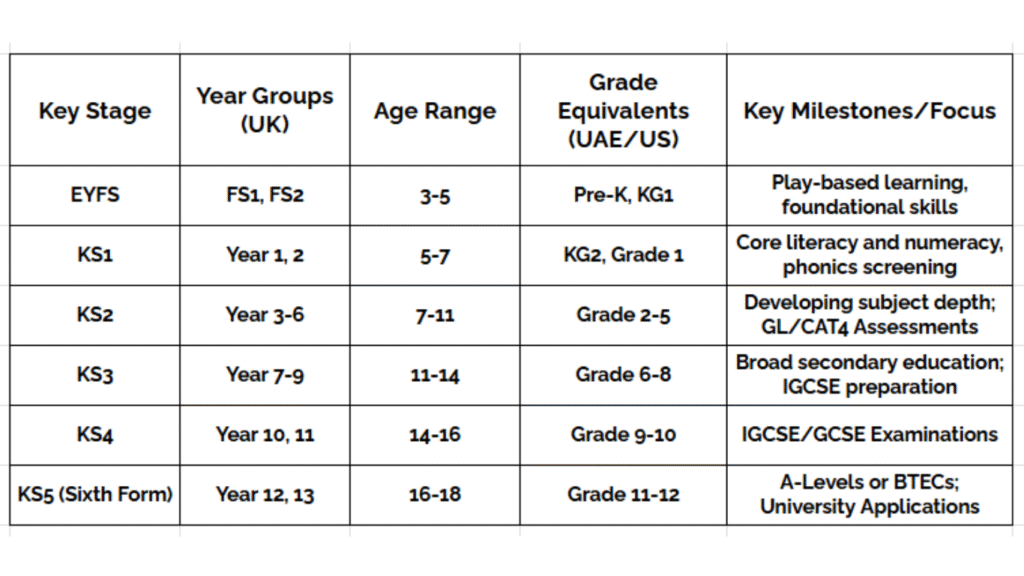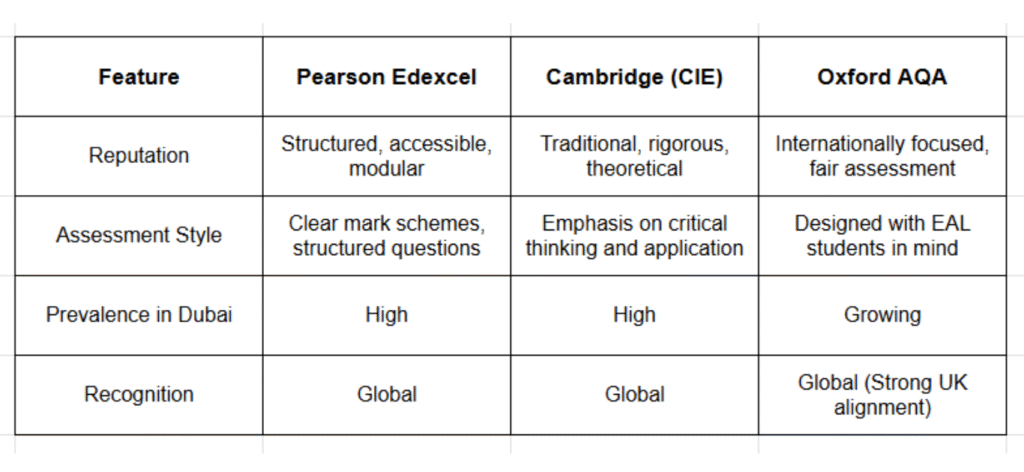The Complete Guide to the British Curriculum in Dubai (2025/2026): Key Stages, Exam Boards, and Success
1. Introduction: Why the British Curriculum Dominates Dubai
The British Curriculum (The National Curriculum for England) is the most popular educational framework in Dubai. According to the latest statistics from the Knowledge and Human Development Authority (KHDA), more students are enrolled in British curriculum schools than any other system in the emirate.
Its popularity stems from its structured progression, academic rigor, and the global recognition of its qualifications IGCSEs and A-Levels which provide direct pathways to the world’s leading universities.

The British Curriculum is a standardized educational framework divided into ‘Key Stages’ (KS). It begins with the Early Years Foundation Stage (EYFS) and culminates in globally recognized qualifications: IGCSEs (at the end of KS4) and A-Levels (at the end of KS5). The system is known for its depth of study, particularly in the later stages, and its structured assessment methods.
The Complexity Beneath the Surface
While the framework is robust, navigating the British Curriculum in Dubai presents unique challenges. It is a highly specialized system, and success often depends heavily on mastering specific exam techniques.
Furthermore, a significant source of confusion for parents is the existence of different “Exam Boards” (such as Edexcel, Cambridge International, and AQA). Understanding which board your child is studying—and the nuances of its syllabus—is crucial for targeted academic support.
This guide will demystify the structure of the British Curriculum from EYFS to Year 13, explain the critical differences between the exam boards operating in Dubai, and provide strategies for academic success in the 2025/2026 academic year.
2. The Structure of the British Curriculum: Understanding the Key Stages
The British Curriculum is organized into blocks known as “Key Stages.” This structure provides a clear framework for progression, ensuring students develop the necessary skills and knowledge before advancing to the next level.
Key Stage Framework Overview
The following table outlines the structure, corresponding ages, and equivalent grades in the UAE/US systems:

Detailed Breakdown of the Key Stages
Regulation, Quality, and Tutoring Permits
The journey begins with the EYFS framework, which focuses on learning through play. It is built around seven key areas of learning, including Communication and Language, Physical Development, Literacy, and Mathematics.
Primary (KS1 & KS2) - Year 1 to Year 6
Key Stages 1 and 2 form the Primary education phase. The focus shifts towards more structured learning in core subjects: English, Mathematics, and Science.
KS1 (Years 1-2): Emphasis is placed on developing strong literacy (including phonics screening) and numeracy skills.
KS2 (Years 3-6): Students delve deeper into subjects. While UK SATs are used domestically, most international schools in Dubai use alternative assessments like GL (Granada Learning) Progress Tests or CAT4 (Cognitive Abilities Test) to measure student attainment and potential.
Lower Secondary (KS3) - Year 7 to Year 9
KS3 is a crucial transitional period. Students study a broad range of subjects. This stage serves as the bridge to the IGCSE years. It is during KS3 that strong study habits must be established. Towards the end of Year 9, students make their crucial IGCSE subject choices.
3. KS4: The Critical IGCSE Years (Years 10 & 11)
Key Stage 4 culminates in the IGCSE (International General Certificate of Secondary Education) examinations, the first major external assessments students face.
What are IGCSEs?
IGCSEs are internationally recognized qualifications that assess a student’s knowledge in individual subjects. They are crucial for entry into Sixth Form (A-Levels or IB) and form the foundation of a student’s academic profile
GCSE vs. IGCSE: What’s the Difference?
Parents often encounter both terms. It is essential to understand the distinction:
GCSEs are typically taken by students in the UK. They often include coursework components and are tailored to a domestic context.
IGCSEs are the “International” version, designed specifically for a global student body. They are predominant in Dubai schools. IGCSEs often focus more heavily on the final examination rather than coursework.
The 9-1 Grading System Explained
The British Curriculum recently shifted from the traditional A*-G grading system to a numerical 9-1 scale. This change provides greater differentiation, especially among high-achieving students.
Grade 9: Higher than the old A* (Reserved for exceptional performance).
Grades 8-7: Equivalent to A*/A.
Grades 6-5: Equivalent to B/C (A Grade 5 is considered a “Strong Pass”).
Grade 4: Equivalent to C (A “Standard Pass”).
Grades 3-1: Equivalent to D-G.
Students aiming for competitive A-Level programs should target Grades 7 and above in their chosen subjects.
Subject Selection Strategy
Students typically take between 8 to 10 IGCSE subjects.
Core Subjects (Mandatory): English Language, English Literature, Mathematics, and the Sciences (Biology, Chemistry, Physics – either combined or as separate subjects).
Electives: Students choose from a range including Humanities, Languages, Arts, and technical subjects.
Choices made at IGCSE level significantly impact A-Level options. For example, studying separate sciences (Triple Award) is often preferred for students planning to pursue science or medicine.
The Intensity of KS4
The jump in difficulty from KS3 to KS4 is substantial. The volume of content increases, and the assessment style requires application and analysis rather than just recall. The pressure of preparing for multiple high-stakes exams simultaneously often necessitates specialized support for the IGCSE examinations.
4. KS5 (Sixth Form): A-Levels – The Gold Standard (Years 12 & 13)
Key Stage 5, often referred to as Sixth Form, is where students specialize intensely, preparing for university education
Defining A-Levels
A-Levels (Advanced Level qualifications) are globally respected for their academic depth. Unlike broader curricula (like the IB Diploma), A-Levels allow students to focus on 3 or 4 subjects they are passionate about. This specialization requires a deep understanding of complex concepts and strong independent study skills
A-Levels and University Admissions (UCAS)
A-Level grades are the single most critical factor for admission to UK universities via the UCAS system. They are also highly regarded globally. Competitive courses (e.g., Medicine, Engineering, Law) often require A* or A grades.
The Structure: AS and A2 Levels
A-Levels are typically divided into two parts:
AS Level (Year 12): The first half of the course.
A2 Level (Year 13): The second half, which delves into more complex material.
Important Note on Assessment Trends: Many subjects have shifted towards a “linear” assessment model, meaning exams covering the entire two years of content are taken at the end of Year 13. However, some international schools in Dubai still use a “modular” approach where AS exams are taken at the end of Year 12, contributing to the final grade. Parents must verify the structure used by their child’s school.
BTECs (Alternative Pathway)
While A-Levels are the academic route, some British schools in Dubai offer BTECs (Business and Technology Education Council qualifications). These are vocational and applied learning qualifications.
The Significant Jump in Difficulty
The leap from IGCSE to A-Level is often the most challenging transition students face. The expectation for independent learning, critical analysis, and essay writing increases dramatically. Students who excelled at IGCSE may find themselves struggling with the depth required at A-Level.
5. The Exam Board Maze: Why Your Board Matters
This is arguably the most misunderstood aspect of the British Curriculum, yet it is critical for academic success. If you only take one thing away from this guide, let it be this: The Exam Board matters.
What are Exam Boards?
The UK government sets the overall curriculum framework. However, independent organizations, known as Exam Boards (or Awarding Bodies), are responsible for creating the specific syllabus (the content taught), the examinations, and the marking schemes.
The Crucial Insight: Not All Syllabi are Created Equal
Different schools in Dubai choose different exam boards for different subjects. This leads to a critical realization:
IGCSE Mathematics with Pearson Edexcel is fundamentally different from IGCSE Mathematics with Cambridge International.
While the core topics overlap, the emphasis, the style of questions, the structure of the exam papers, and the specific language used in the marking criteria vary significantly.
This is why generic tutoring is often ineffective. A tutor MUST be specialized in the student’s specific exam board. This is why learning how to verify a tutor’s exam board expertise is crucial. They need to understand the nuances of the syllabus and the exact requirements of the mark scheme.
Note: Rates for freelance tutors found on classified sites may be lower, but this often comes without the assurance of verified qualifications, background checks, or accountability.
The Major Players in Dubai
In the UAE, three exam boards dominate the British Curriculum landscape:
Pearson Edexcel
Profile: Edexcel (owned by Pearson) is highly popular among international schools in Dubai. It is often perceived as structured and accessible.
Style: Edexcel is known for its clear assessment structures and extensive support materials. Their questions are often broken down into smaller parts, guiding the student through the problem-solving process.
Cambridge Assessment International Education (CIE)
Profile: Part of the University of Cambridge, CIE carries a prestigious and traditional reputation.
Style: CIE is often considered more rigorous and theoretical. The assessments emphasize critical thinking, deep subject knowledge, and the application of concepts in unfamiliar contexts. Their questions may be more open-ended, requiring students to structure comprehensive arguments.
Oxford AQA International
Profile: A partnership between Oxford University Press and AQA (the largest provider in the UK). Oxford AQA is a growing presence in the Middle East.
Style: They emphasize “Fair Assessment,” ensuring that exams test subject ability rather than cultural knowledge or language complexity. This makes their syllabi particularly suitable for international students, including those for whom English is an Additional Language (EAL).
(Note: Other boards like OCR or WJEC are prominent in the UK but rarely used by international schools in Dubai.)
Exam Board Comparison Table

6. The British Curriculum in the Dubai Context
While the British Curriculum provides the academic framework, education in Dubai is also shaped by local regulations and quality assurance bodies.
KHDA Inspections and the DSIB Framework
The Knowledge and Human Development Authority (KHDA) plays a pivotal role in ensuring educational quality in Dubai. The Dubai Schools Inspection Bureau (DSIB), part of the KHDA, conducts annual inspections of all private schools.
Schools are rated on a scale from ‘Outstanding’ to ‘Weak’. These inspections rigorously evaluate teaching quality, student outcomes, leadership, and curriculum integration
BSO Accreditation
In addition to KHDA inspections, many premium British schools seek accreditation as British Schools Overseas (BSO). This voluntary inspection scheme is overseen by the UK Department for Education and ensures that the school meets standards comparable to independent schools in England.
Mandatory Subjects (MoE Requirements)
Schools in the UAE must also adhere to the requirements of the Ministry of Education (MoE). This means that within the British Curriculum framework, students must also study:
Arabic: (Different levels for native and non-native speakers).
Islamic Studies: (Mandatory for Muslim students).
Moral, Social, and Cultural Studies (MSCS).
Integrating these mandatory subjects alongside the demands of IGCSEs and A-Levels requires careful time management.
Switching Curricula: Moving to the British System
Dubai’s transient expat population means students frequently switch between curricula. Moving from the IB, American, or Indian systems to the British Curriculum presents specific challenges:
From IB (PYP/MYP): The British system is generally more exam-focused earlier on. Students may need to adapt to a different style of assessment.
From American/Indian Systems: The depth required at A-Level is often significantly higher than equivalent Grade 12 qualifications.
Transitioning students often require targeted tutoring to bridge content gaps and adapt to the specific assessment techniques of the British system.
7. How Specialized Tutoring Supports British Curriculum Success
The inherent structure and assessment methods of the British Curriculum make it particularly suited for targeted, specialized tutoring.
Board-Specific Expertise: The Non-Negotiable Factor
As detailed in Section 5, knowing the exam board is paramount. A specialized tutor provides:
Syllabus Mastery: Intimate knowledge of the exact content that will be examined.
Mark Scheme Insights: Understanding how examiners award marks for specific question types (e.g., knowing the keywords Edexcel expects in a Biology definition).
Mastering Exam Technique
The British system heavily rewards exam technique. It’s not just about what a student knows, but how they present that knowledge. Tutors help students practice past papers extensively, providing feedback on structure, timing, and clarity skills often underdeveloped in a busy classroom setting.
Note: Rates for freelance tutors found on classified sites may be lower, but this often comes without the assurance of verified qualifications, background checks, or accountability.
Targeted Support at Key Transitions
Tutoring provides crucial support during the difficult academic jumps:
KS3 to IGCSE: Building the foundational skills for external examinations.
IGCSE to A-Level: Developing the independent learning and analytical depth required for advanced study.
The GetYourTutors.com Approach
We understand that success requires specialized expertise. Our commitment to vetting tutors ensures they are specialists in the specific exam boards. Our vetting process ensures that our tutors are not just subject experts, but specialists in the specific exam boards taught in Dubai.
You don’t just need a Physics tutor; you need to find an A-Level Physics expert specialized in AQA.You don’t just need a Math tutor; you need specialized IGCSE Math support for the Cambridge syllabus. This targeted approach is the key to unlocking top grades.
8. FAQs: The British Curriculum in Dubai
What is the difference between IGCSE and GCSE?
IGCSEs (International GCSEs) are designed for an international student body and are the standard in Dubai. GCSEs are typically taken in the UK and may include more domestic context and coursework. Both are equally recognized.
Is the British Curriculum harder than the IB?
They are different, rather than harder or easier. The British Curriculum (A-Levels) focuses on depth and specialization (3-4 subjects), while the IB Diploma focuses on breadth (6 subjects plus the Core components). Students who prefer to specialize deeply often thrive in the A-Level system. (Link to IB vs. A-Level Comparison Article – To be created in Phase 3
What is a "good" grade in the 9-1 system?
A Grade 4 is a “Standard Pass,” and a Grade 5 is a “Strong Pass.” However, for entry into competitive A-Level programs and top universities, students should aim for Grades 7 (equivalent to an A) and above (8 or 9).
How many A-Levels should a student take?
The standard requirement for university admission is three full A-Levels. Highly motivated students may take four. Quality is prioritized over quantity; three A* grades are better than four B grades.
Do universities prefer specific exam boards?
No, universities recognize all major exam boards (Edexcel, Cambridge, AQA, OCR) equally. The grades achieved are what matter, regardless of the awarding body.
9.Conclusion: Achieving Excellence in the UK System
The British Curriculum offers a world-class education, providing a structured and rigorous pathway from foundational learning to specialized university preparation. However, its complexities—particularly the demands of IGCSEs and A-Levels, and the critical differences between exam boards require a strategic approach to learning.
Success in this system depends on targeted support, mastery of exam techniques, and a deep understanding of the specific syllabus requirements.
Take the Next Step
Ready to find the perfect academic mentor for your child?